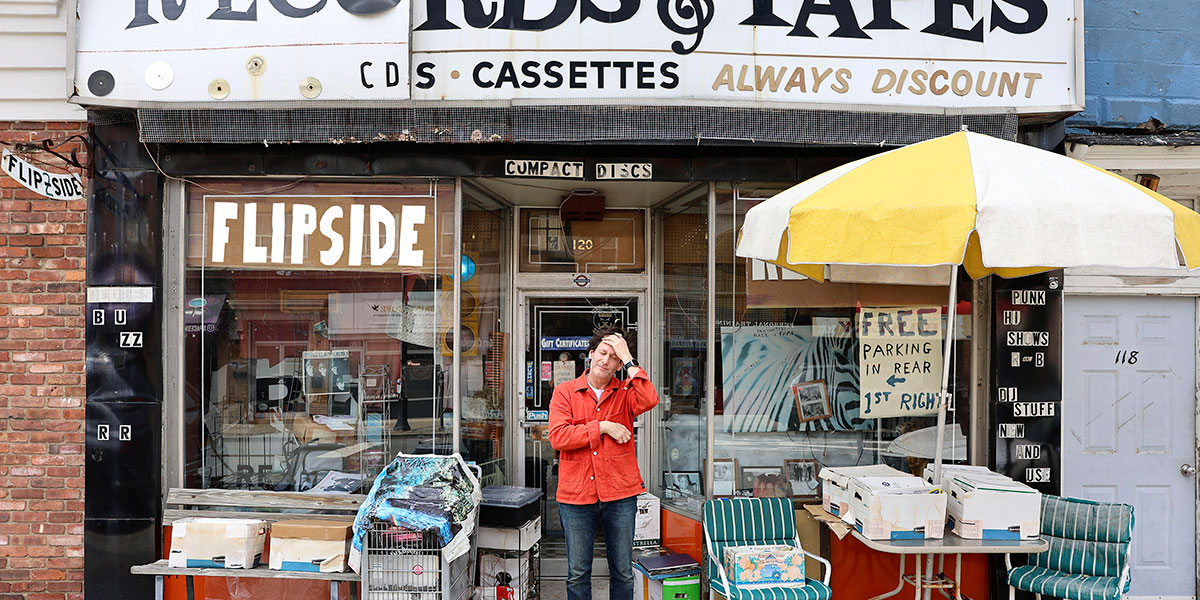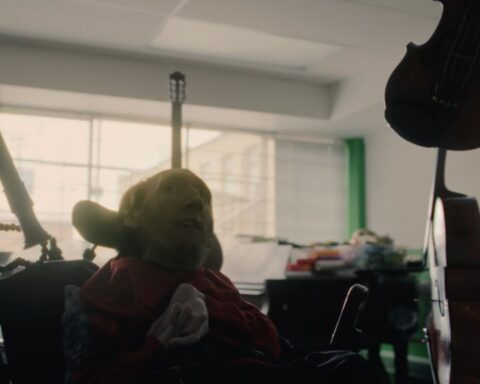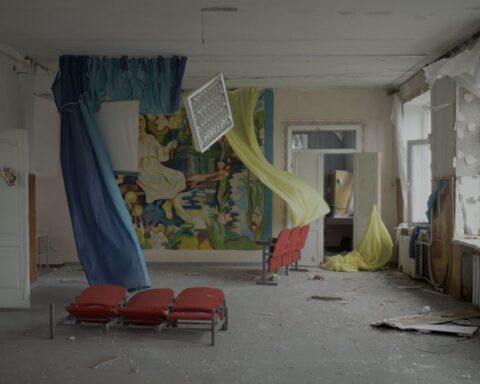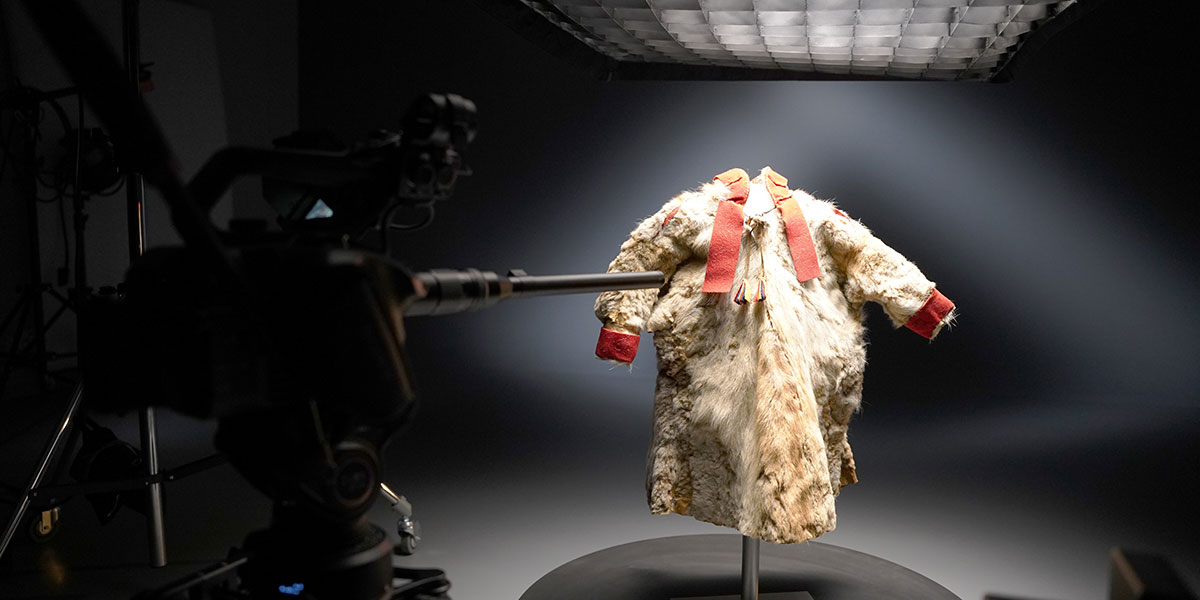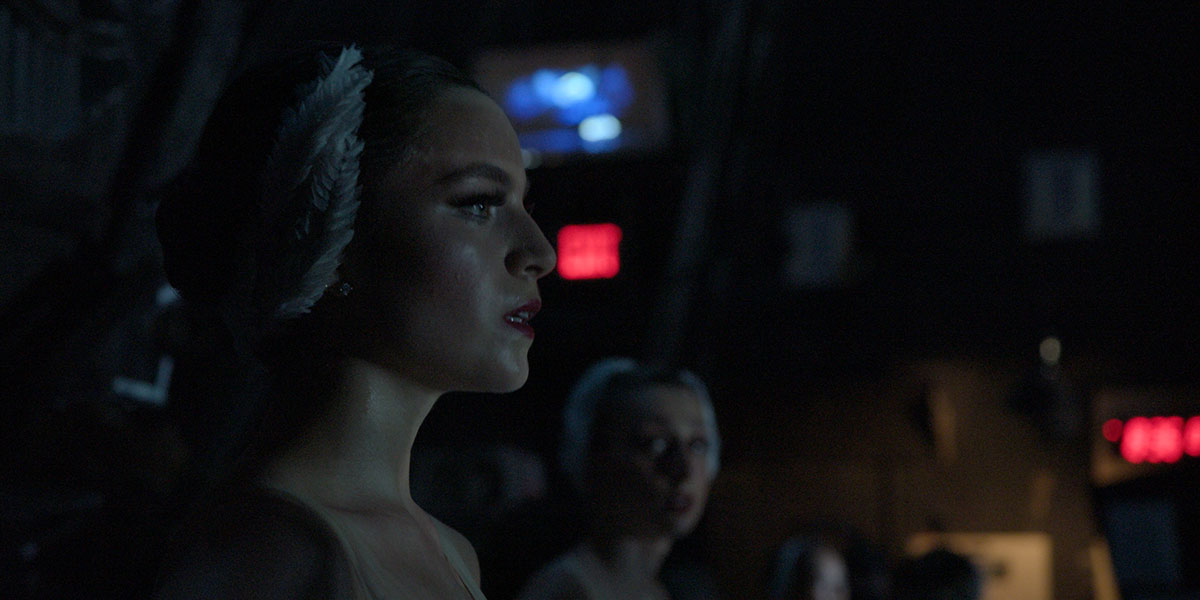A forgotten jazz photographer given gallery attention late in life. An irascible record store owner surrounded by the vinyl he has hoarded over decades. A writer struggling to live up to the commitments of an advance. Another writer being robbed of his memories and faculties after tremendous success. And a filmmaker with bits and pieces of unfinished stories, hard drives full of half-baked ideas and documentary dead ends.
This is the world Chris Wilcha navigates in Flipside, a lively, engaging rumination on the midlife musings of a meandering Generation X storyteller. Flipside takes viewers on a journey up river into the dark heart of the creative process where one fights the strong current of procrastination. The fear of being indulgent or redundant chills to the bone. Against the pragmatic need to survive economically, there’s this tumultuous draw towards creative expression. While the path is fraught, and the addictive draw of assembling disparate pieces is overpowering, Wilcha finds a way to combine these elements into one satisfying voyage through the creative process of making documentaries and pursuing one’s passions even during the B-side of life as he looks through half-finished projects and sees his career come full circle as he returns to Flipside, the record store where he once worked, to fulfill a promise about a documentary he never made.
POV spoke with Wilcha prior to the Flipside’s premiere at this year’s Toronto International Film Festival.

POV: Jason Gorber
CW: Chris Wilcha
The following has been edited for brevity and clarity.
POV: I think it will be easy for some people to dismiss this film thinking that it’s narcissistic, but you’ve said something incredibly beautiful about the creative process.
CW: I did not want to make a middle-aged navel-gazing nightmare, a narcissistic nightmare. But I also felt like I hadn’t seen people of my age reflecting on a Gen X midlife crisis moment. I did not go in with a plan to overcome this.
What I ended up doing was finding that the other people’s stories were carrying a lot of the ideas. We started to call them case studies, and they are documentaries within the documentary. You’ve got Ira Glass, you’ve got this jazz photographer Herman Leonard, and you’ve got [TV writer/producer] David Milch. My hope was that a balance of my narration and tour guide perspective could thread these stories together and structure them in a way that you could get at some bigger ideas that weren’t just about one person’s paralysis. Rather, it’s about how challenging creative work is, and how challenging it is making a living doing creative work. The hope was that through this kaleidoscope of voices, you could get at some of those ideas.
POV: I was born in ’72, so I’m solidly in that generation where we were so self-conscious about being self-conscious, and a built-in refusal to take anything so seriously without irony.
CW: That was the Gen X-ness of it all. It is shocking how the notion of selling out has an almost nostalgic quaintness, and that was a generational obsession. I remember it amongst my own friends. The funny part was that the stakes were of course much lower. We were worrying about what bands were signed to what labels or what brand was or wasn’t authentically targeting your demographic. I have friends who are musicians and writers—the distinction is almost meaningless now. You want to sell, you want your song in that [market], you want to sing for that commercial. I totally understand that. The hustle is so much harder now, and the music business is even more brutal. The Gen X armour of irony had to come down, and I had to be a little bit reflective about my own life.
POV: Some people might say we don’t need your story. We don’t need a middle-aged Caucasian dude’s story. You provide an opportunity to amplify voices in your film, but you take that extra step of believing that your voice is still one that isn’t deleterious to include.
CW: This was a concern and a conversation throughout the process. There were moments where I honestly wondered if I should follow through and make the thing. Like David Milch talked about, I am a person who loves to make things, to work out creative problems and figure things out.
I felt that it was still a story worth telling. That there was still a collection of voices and an attempt to reflect on midlife as a Gen Xer that was worth following through. A lot of people in my universe are creative people who are reflecting right now about what they did or didn’t accomplish, about who they thought they were going to be at age 25, compared to who they are at 50 or 55.
I also find the first person mode to be an effective way to tell stories because you can digress and use yourself as a narrator. While other voices are being amplified, I felt there was a universal ache that a lot of my creative peers were feeling. I wanted to take a chance and try to put that story out in the world.
POV: How does it feel to finish all of these things with one larger project?
CW: When you’re a creative person who wants to make things, you’re attracted to an idea. There’s a pull. I was always chasing those things, yet for many reasons, they would fall apart. It wasn’t always my own insecurity or my creative doubt. Often the subject would flake, or the project would fall apart, or the money would run out.
A lot of people in my world right now have talked about starting to give up. They’re starting to say, “I’m never going to make that, I’m never going to write that book, I’m never going to start that small business.” Finally making this film provides an immense sense of relief. I feel like I’m still capable of making movies that I care about. I still want to try to make things that have meaning.
POV: When you finally had an assembly cut, it must have been challenging and moving, both emotionally and aesthetically.
CW: One of the things about adult life is realizing you have to hold contradictory things in balance. There was a moment when I was like, “Fuck, did I waste a lot of time in all of this chasing these things?” There are a lot of other projects that didn’t get made and didn’t make it into the film. These hard drives were languishing, and they would taunt me. Their ports would become obsolete as the years would pass and I would have to buy dongles and weird jerry-rigged things to look at the footage that was on them. We had many scary moments of the footage decaying and files being corrupt.
I have emotionally procrastinated feeling the big feelings until this first big screening in Toronto. My family’s going to be there. A bunch of the cast members, everyone who made it, is coming up for this. My parents haven’t seen a frame of this thing…The completion of it hasn’t totally washed over me.
POV: This is a movie about people who did not grow up with Facebook or Myspace, where sharing yourself was not weaponized or technologized, as we’ve seen in the swath of the millennial and post-millennial generations who grew up on the Internet. The record store is a testament to a particular technology that itself has seen waves, itself has seen a notion of what is hip and what is not.
CW: …I saw a headline about how most young people buying albums don’t own turntables now?
POV: Yeah. 50% of purchasers of vinyl do not have a record player. But, for your film, the record store has not changed, while everything around you changed. The moment in the film that is crushing and accurate is when you are selling your collection: you go to a different store. I felt that so hard. I’m just wondering if you could unpack that a little bit more.
CW: I love Dan, Flipside Dan. But I think that he’s one of those people, who, the way things have changed, he has really tapped out. In a Luddite way. He is not interested in anything online. He doesn’t have a smartphone. I don’t think he even has a cellphone. There was a moment where it was kind of charming and he was the classic grumpy record store owner who was just against technology. He used to rail about Facebook and Google and talk about privacy issues, and of course he has turned out to be right about many things.
But the thing I saw about Dan at that point was that he truly was getting left behind. It was detrimental to the health and future of the store. I would lightly nudge him, but the thing is you can’t force a person to care about Instagram and posting and taking pictures. All of the stuff I collected over the years still has a lot of meaning to me, and I felt like if I brought it to Flipside, it might very well disappear. It might very well never be played again. The thing that is exciting when you go into that other store, Station One, is that it’s an ecosystem. Things land on those new release shelves, new acquisition shelves, and they’re gone by that afternoon. People flood the store to get the stuff. There’s a buzz and an energy about that place.
POV: On one hand, Flipside Dan [both record store owners are named Dan] is more pure: he’s the one who didn’t sell out, who held on to the vision of what it was. In some ways, by refusing to adapt, he gets left behind. While the other Dan, which might be a little more of a “sellout,” and the person finding your Jane’s Addiction cassette might never even play that tape, but they will at least take it home rather than have it fall into the abyss of Flipside.
CW: That is true. Flipside Dan’s story is definitely the story of not selling out. That was a road not taken for me. I could have been the guy who stayed in town, I could have been the record store owner, I could have stayed the recalcitrant purist.
POV: The filmmaker who never made commercials and probably never made films.
CW: I live in a perpetual state of figuring out how to make a living. There’s a constant battle between doing these things that you feel slightly compromised by versus doing things that you feel are a bit more pure.
POV: Yet the guy who feels like he’s not compromised on anything has a store that smells like meat. Which compromise are we going to choose here? He’s not going to use a cellphone because they’re monitoring him, but his store smells like meat. There but by the grace of God goes I.
CW: That is a central thing for me. I hope this comes across: I want that store to survive. My dream would be this film creeps out into the world and some people make a pilgrimage there.
POV: I’m driving to New Jersey. It’s not even a question.
CW: The idea that someone would go there after seeing this documentary and spend 100 bucks would make me so happy. There’s a kid in that documentary [to whom] I said, “Hey, do you shop at Flipside, which is a minute and a half walk away?” He said literally, “I will not set foot in there.” And I think that kid is the kid who buys things that are more [like] analogue artifacts that you put on the shelf. It’s not about the playing or discovery. Search engine shopping has made everything sort of frictionless, so any friction is avoided.
Dan’s is the crate digging shop. The thing that got difficult is that you are literally filthy when you leave. You have to move things. It’s labour intensive shopping. It is not a joyful experience. It takes work. And there’s only a certain kind of person who’s going to discover things there.
POV: It’s like everybody who wants to fetishize analogue has to remember how heavy a record crate is.
CW: Totally.
POV: I have a bazillion dollar turntable cartridge that broke after two months. Every time that happens, I have to say aloud, “Spotify.” We are crazy for choosing the harder path of vinyl. You are crazy for making films. Nothing would be easier than for you to cash the cheques making commercials. So I’m going to ask the fundamental question: Why do you do this to yourself?
CW: There’s this moment when David Milch makes an observation later in the film where he talks about how when you’re making things, or you’re in the presence of art that other people are making, this feeling washes over you. That is such an addictive feeling, trying to make meaning out of nothing.
It’s an instinct to go back to that record store. It first started that it was going to be a little YouTube eulogy—shoot a five-minute thing and post it. But I kept going back. I kept trying to understand why this filthy fountain of youth kept pulling me back. I would love to spend my time that way, trying to make things and connect ideas and glean insights from this kind of work. I’m still addicted to that.
POV: Hence the beautiful, central metaphor of Flipside: On Side A, you have one path for your life; on Side B, another. So many people basically live in the runout groove, locked in place. They live in that area at the end of the record where the arm is just going back and forth and they never have the courage or the insanity to flip the record. Do you think this is going to open you up to other documentary projects?
CW: The heart of the process and dream of doing this was to crack back open the space to make things. I had calcified into this commercial director. I had calcified into the routines of chasing the next job and the freelance grind. That grind was all consuming. I hate to call it a dream, but, yes, I dream that the film opens up the space to make creative work again.
It’s also a tricky moment in the documentary universe. The golden age of was about five to eight years ago. Money had flooded in, and all of the streamers were paying tippy top rates for high-end documentary work. I sort of sat that out. I didn’t want to, but at that point, I was not getting the phone call to direct this or that. I have friends and peers who get those calls and they’ve built small empires around doing that.
POV: What is some of the vinyl that you found at Flipside that continues to resonate with you?
CW: I literally have a stack leaning against a wall…Can I go grab and we’ll see? [He goes across the room to picks up a pile of records to show off to camera.] OK, so here’s the thing about Flipside: you don’t go there looking for something you want. You go there and you find things you did not know existed. So one of the last times I was there, I got something called The Nonesuch Guide to Electronic Music. It’s, like, five albums. The cover is a spectacular, beautiful abstract painting. It’s five pieces of vinyl…a relentless catalogue of stuff.
This is a Bobcat Goldthwaite album called Meat Bob, and he’s in a giant meat thing. I just grabbed it and it’s like, four, five bucks. I looked on eBay and I saw one for $81 dollars. I’m not interested in reselling this, but it’s one of those things. Then, a classic reissue—the Dead Kennedys. I hadn’t thought a lot when I was younger about the Dead Kennedys and how it’s surf music. There was a surf one that I bought at the same time that was like an echo. Then here’s another classic. This is what you’ll find at Flipside: How to Take Better Photographs, an old instructional thing from a Time Life photographer.
I’m not going in there looking for these records. It’s almost like the confetti from the 20th century. You go and you dig and you make discoveries.
POV: Your film is akin crate digging because your film itself is finding those disparate things as we go through and we see the connections that were never there until we saw them in one place, be it Flipside, or be it your film.
CW: There was a moment when we flirted with structuring it as an album, but it was a little too on the nose. That’s why I think the first person is such a great tool, because you can write in a slightly more sophisticated way. You can smuggle in thoughts. It’s a weird form of writing; it’s almost aphoristic, like you can’t go deep, you can’t write a whole paragraph, you have to say it in a sentence or even less.




